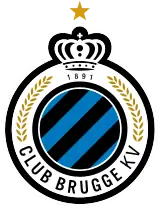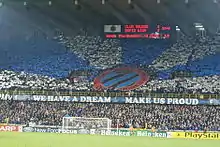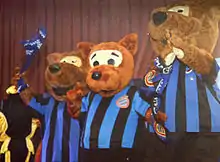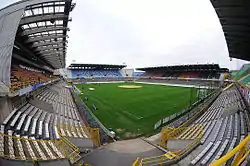Club Brugge KV
Club Brugge Koninklijke Voetbalvereniging (Dutch pronunciation: [klʏˈbrʏɣə ˌkoːnɪŋkləkə ˈvudbɑlvəreːnəɣɪŋ]),[2] commonly referred to as just Club Brugge, or Club Bruges commonly in English, is a Belgian professional football club based in Bruges in Belgium. It was founded in 1891 and its home ground is the Jan Breydel Stadium, which has a capacity of 29,062.[3]
 | ||||
| Full name | Club Brugge Koninklijke Voetbalvereniging (Club Bruges Royal Football association) | |||
|---|---|---|---|---|
| Nickname(s) | Blauw-Zwart (Blue-Black), Club, FCB | |||
| Founded | 13 November 1891 Stamnummer (matricule number) 3 | |||
| Ground | Jan Breydel Stadium | |||
| Capacity | 29,062[1] | |||
| President | Bart Verhaeghe | |||
| Manager | Philippe Clement | |||
| League | Belgian First Division A | |||
| 2019–20 | Belgian First Division A, 1st (champions) | |||
| Website | Club website | |||
|
| ||||
One of the most decorated clubs in Belgian football, the club have been crowned Belgian league champions 16 times, second only to major rivals Anderlecht, and it shares the Jan Breydel Stadium with city rival Cercle Brugge, with whom they contest the Bruges derby.[4]
Throughout its long history, Club Brugge has enjoyed much European football success, reaching two European finals and two European semi-finals. Club Brugge is the only Belgian club to have played the final of the European Cup (forerunner of the current UEFA Champions League) so far, losing to Liverpool in the final of the 1978 season.[5] They also lost in the 1976 UEFA Cup Final to the same opponents.[6][7] Club Brugge holds the European record number of consecutive participations in the UEFA Europa League (20), the record number of Belgian Cups (11),[8] and the record number of Belgian Super Cups (15).[9]
History
| |||||||||||||||||||||||||||||||||||||||||||||||||||||||||||||||||||||||||||||||||||||||||||||||||||||||||||||||||||||||||||||||||||
In 1890, students from the Catholic school Broeders Xaverianen and the neutral school Koninklijk Atheneum joined together to form the Brugsche Football Club. The former students christened the club's founding by establishing the Latin motto 'mens sana in corpore sano' (a healthy mind in a healthy body).[10] A year later on 13 November 1891, the club was re-created under Brugsche FC, and this is now seen as the official foundation of the current Club Brugge In 1892, an official board was installed at the club to oversee all operations and team decisions. In 1895, the national athletics sports union was founded, predecessor of the later national football association, under the name UBSSA (Union Belge des Sociétés de Sports Athlétiques); Brugsche FC was a founding member of the UBSSSA and as such took part in the first league campaign organized in Belgian football during the 1895–96 season.[11] Financial difficulties the following year forced the club to leave the UBSSA and soon after, Football Club Brugeois were formed by breakaway club members. The two sides were reunited in 1897 under the French name of Football Club Brugeois; they did not take on the Flemish title Club Brugge until 1972.[10]
In 1914, FC Brugeois reached their first Belgian Cup final, but lost 2–1 to Union SG. Six years later, the club claimed their first trophy, by winning the Belgian First Division during the 1919–20 season.[12] They celebrated by changing their title to Royal FC Brugeois – with their regal status now reflected in their modern prefix KV, standing for Koninklijke Vereniging (royal club).[10] Only eight years later though, the club was relegated to the Belgian Second Division for the first time in their history following a relegation play-off.[12] Further lean times followed the relegation in 1928, as they spent much of the 1940s and 1950s in the second division of Belgian football.[10]
Following the 1958–59 season, the club earned promotion back to the First Division and have not been relegated since.[10] The club were able to add to their trophy cabinet in 1968, winning the first of their record 11 Belgian Cup titles for the first time after defeating Beerschot A.C. 7–6 in a penalty-shootout after a 1–1 draw.
The club enjoyed their most success under legendary Austrian manager Ernst Happel as he led the club to three straight league championships from 1975–76 to 1977–78 and a Belgian Cup victory in 1976–77.[13] Happel also guided Club Brugge to their first European final, reaching the 1976 UEFA Cup Final. Over the two-legged final against English giants Liverpool, Club Brugge fell 3–4 on aggregate.[14] Two years later, Brugge again met Liverpool in a European final, this time in the 1978 European Cup Final at Wembley, becoming the first Belgian club to reach the final of the competition. Brugge fell to a lone second-half goal from Kenny Dalglish as Liverpool won their second European Cup and third European trophy in succession.[15][16] Following the cup final loss to Liverpool, Happel left Club Brugge and would lead Netherlands later that summer to the final of the 1978 FIFA World Cup.[17]
On 25 November 1992, Brugge player Daniel Amokachi became the first goal scorer in the Champions League. He scored in a 1–0 win over CSKA Moscow.[18]
Crest and colours
The club don a black and blue home kit as has been traditional through their history. Away from home they wear a red strip. The club's current kit supplier is Macron.[19]
Stadium
The club's original home in the Sint-Andries district of Bruges was known as the Rattenplein (rats' stadium) since it was owned by the local fox terrier club, who used it for another imported English pastime: rat baiting.[20][10] This non-UEFA affiliated 'sport' involved getting dogs to chase and kill rats.[20][10] In 1911, the team moved to a new ground, called De Klokke (after a nearby pub), which was renamed the Albert Dyserynckstadion after the sudden death of Club Brugge chairman Albert Dyserynck.[10]
Their current stadium, since 1975, was rebranded in honour of local butcher and revolutionary Jan Breydel in 1998.[10] Breydel led a rising against the city's French overlords in the 1300s.[10] The venue – which Club Brugge share with local rivals Cercle Brugge – was previously named the Olympiastadion.[10][21]
In November 2016, the club broke ground on a new training complex at Westkapelle, including four training pitches and an additional training centre for the senior squad plus the U21 and U19 teams; all in addition to the already available sports complex Molenhoek.[22]
Supporters

Club Brugge is the most supported club in Belgium. It has fans all over the country. Attendances are high. The Jan Breydel Stadium is almost sold out at every home game. Some of these fans are part of 62 supporter clubs in Belgium, which have more than 10,000 members. The "Supportersfederatie Club Brugge KV", founded in 1967, is recognized as the official supporters club of Club Brugge. The federation is made up of 60 recognized supporters' clubs and has an elected board to steer the operation in the right direction.[23]
In tribute to the fans, often dubbed the twelfth man in football, Club Brugge no longer assigns the number 12 to players. Club Brugge also has a TV show, CLUBtv, on the Telenet network since 21 July 2006.[24] This twice weekly show features exclusive interviews with players, coaches and managers.
Mascot

The official mascot of Club Bruges is a bear, symbol of the city of Bruges. The history of the bear is related to a legend of the first Count of Flanders, Baldwin I of Flanders, who had fought and defeated a bear in his youth. Since the end of 2000, a second mascot, always a bear, travels along the edge of the field during home games for fans to call and encourage both their favorites. These two bears are called Belle and Bene. In 2010, a third bear named Bibi, made its appearance. He is described as the child of the first two mascots, and is oriented towards the young supporters.
Rivalries
Like many historic clubs, Club Brugge contests rivalries with other Belgian clubs, whether at local (Cercle Brugge) or regional level (Gent and Antwerp) or nationally competitive (Anderlecht and Standard Liège).
Gent
At regional level, Club Brugge has maintained rivalry with Gent, a team in the neighboring province. The successes achieved by the club in the early 1970s, combined with very poor season performances by Gent in the same period, attracted many fans. Since the late 1990s, Gent again played a somewhat more leading role in Belgium, and matches between the two clubs were often spectacles. The game between the two teams is called "De Slag om Vlaanderen" or translated "The Battle of Flanders", this is because both teams have been the best teams in Flanders over the last 20 years.
Anderlecht
The rivalry between Club Brugge and Anderlecht has developed since the 1970s. At that time, the Brussels-based club and Club Brugge won most trophies between them, leaving little room for other Belgian teams. Matches between these two teams were often contested for the title of champion of Belgium. Three Belgian Cup finals were played between the two clubs (with Anderlecht winning once and Club Brugge twice), and they played seven Belgian Supercups (Club Bruges won five). A match between these two sides is often called 'The Hate Game'. They are arguably the most heated fixtures in Belgian football together with clashes between the other two members of the Big Three - Anderlecht and Standard Liège.[25][26]
Honours
Domestic
- Winners (16): 1919–20, 1972–73, 1975–76, 1976–77, 1977–78, 1979–80, 1987–88, 1989–90, 1991–92, 1995–96, 1997–98, 2002–03, 2004–05, 2015–16, 2017–18, 2019–20
- Runners-up (23): 1898–99, 1899-00, 1905–06, 1909–10, 1910–11, 1966–67, 1967–68, 1969–70, 1970–71, 1971–72, 1984–85, 1985–86, 1993–94, 1996–97, 1998–99, 1999-00, 2000–01, 2001–02, 2003–04, 2011–12, 2014–15, 2016–17, 2018–19
Players
First-team squad
- As of 30 January, 2021[27]
Note: Flags indicate national team as defined under FIFA eligibility rules. Players may hold more than one non-FIFA nationality.
|
|
Out on loan
|
|
Reserves and Club NXT (Youth Academy)
- As of 6 January 2021[28] – Note: Reserve players are given a "B" squad number although they aren't used as shirt numbers. The squad numbers below are registered for the first team.
Note: Flags indicate national team as defined under FIFA eligibility rules. Players may hold more than one non-FIFA nationality.
|
|
Retired numbers
12 – The 12th man (reserved for the club supporters)
23 – ![]() François Sterchele, striker (2007–08). Posthumous; Sterchele died in a single-person car accident on 8 May 2008.
François Sterchele, striker (2007–08). Posthumous; Sterchele died in a single-person car accident on 8 May 2008.
Former players
Club captains
Coaching staff
First-team staff
- As of 27 July 2020[27]
| Position | Name |
|---|---|
| Head Coach | |
| Assistant Coach | |
| Assistant Coach | |
| Goalkeeping Coach | |
| Physical Coach | |
| Physical Coach | |
| Performance Specialist | |
| Talent Coach | |
| Team Manager | |
| Team Doctor | |
| Team Doctor | |
| Physiotherapist | |
| Physiotherapist | |
| Physiotherapist | |
| Masseur | |
| Video Analyst | |
| Team Support | |
| Team Support |
Reserves staff
| Position | Name |
|---|---|
| Head Coach T1 | |
| Assistant Coach T2 | |
| Physical Coach | |
| Physiotherapist | |
| Goalkeeping Coach | |
| Team Support | |
| Team Support | |
| Video Analyst | |
| Video Analyst |
Club Academy staff
| Head Coach U18 | |
| Head Coach U16 | ? |
Board of Directors
| Position | Name |
|---|---|
| President | |
| Board Member | |
| Board Member | |
| Board Member | |
| Board Member | |
| CEO |
See also
- Club YLA (Club Brugge women)
References
- Jan Breydel Stadium clubbrugge.be (last check 20 October 2017)
- Club in isolation: [klʏp].
- Jan Breydel Stadium clubbrugge.be (last check 20 October 2017)
- "Lost in…Bruges (Club Brugge – The Bruges Derby)". Lost Boyos. 15 August 2014. Retrieved 14 December 2019.
- Lacey, David (10 May 1978). "Liverpool's tunes of glory". The Guardian. London. Retrieved 20 April 2011.
- Ross, James M. (9 January 2008). "UEFA Cup 1975–76". Rec.Sport.Soccer Statistics Foundation. Archived from the original on 17 August 2011. Retrieved 24 April 2011.
- "Liverpool clinch it". Daily Mirror. London. 20 May 1976.
- "Club Brugge KV". UEFA. Retrieved 14 December 2019.
- "Belgium - List of Super Cup Finals". RSSSF. Archived from the original on 9 November 2013. Retrieved 14 December 2019.
- "Ten claims to fame: Club Brugge". UEFA. 11 March 2015. Retrieved 13 December 2019.
- Henshaw 1979, p. 75.
- Ploquin, Phil; Nackaerts, Luc; Coolsaet, Jeroen. "Belgium – Final Tables 1895–2008". The Rec.Sport.Soccer Statistics Foundation. Retrieved 16 December 2018.
- "Ernst Happel: The 'Weird Man' Who Conquered European Football and Helped Shape the Modern Game". 90 Min. 8 August 2019. Retrieved 14 December 2019.
- Wood, Chris. "Great matches: Liverpool beat Bruges over two legs". LFC History. Retrieved 14 December 2011.
- "Wembley glory as Reds beat Bruges". Liverpool F.C. Retrieved 24 April 2011.
- "Liverpool 1, FC Bruges 0". Liverpool Echo. 11 May 1978. Retrieved 14 June 2017.
- "2 goal Kempes sinks the Dutch". Glasgow Herald. 26 June 1978. p. 23. Retrieved 30 April 2014.
- "Amokachi Relives Historic Champions League Strike". Goal. 26 November 2008. Retrieved 30 June 2020.
- "Club Brugge & Macron present the new 2019/20 season kits!". macron.com. Macron. 28 June 2019. Retrieved 14 December 2019.
- "Het Rattenplein, de eerste "thuis" van Club Brugge". Club Brugge (in Dutch). 25 July 2016. Retrieved 14 December 2019.
- "Stadion - Club Brugge". Club Brugge (in Dutch). Retrieved 14 December 2019.
- "New training complex for Club at Westkapelle". Club Brugge. 16 November 2016. Retrieved 14 December 2019.
- "Werking". Supportersfederati (in Dutch). Retrieved 14 December 2019.
- "TELENET EN CLUB BRUGGE LANCEREN 'CLUB TV'". Telenet (in Dutch). 20 July 2006. Retrieved 14 December 2019.
- "CLUBNIEUWS. Afdankertjes bij Anderlecht, Standard én Club Brugge". Nieuwsblad.be. 13 August 2015. Retrieved 19 May 2016.
- "'Grote Drie' die samen nog eens winnen dat was al heel lang geleden". HLN.be. 30 November 2013. Retrieved 19 May 2016.
- "team - noyau a". clubbrugge.be. Retrieved 14 December 2019.
- "Club NXT U23". Club Brugge KV. Retrieved 6 January 2021.
Bibliography
- Henshaw, Richard (1979). The Encyclopedia of World Soccer. Washington, D.C.: New Republic Books. ISBN 0-915220-34-2.
External links
| Wikimedia Commons has media related to Club Brugge. |
- Official website (in Dutch, French, English, and Spanish)
- Official Facebook Fanpage
- Official Twitter account
- Official Fan Federation (in Dutch)
- Blue Army – Fan Association & Fan-zine (in Dutch)
- Club Brügge KV XtraTime Fanpage (in English)
- Club Brügge at UEFA.COM (in English)
- Club Brügge at EUFO.DE
- Club Brügge at Weltfussball.de
- Club Brügge at Football Squads.co.uk
- Club Brügge at National Football Teams.com
- Club Brügge at Football Lineups.com
